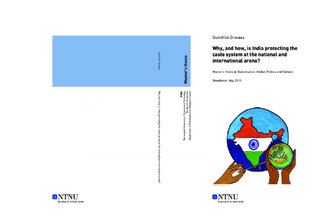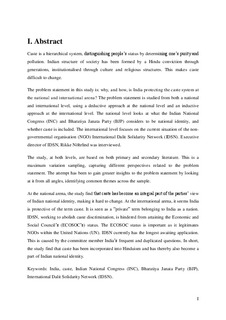| dc.description.abstract | Caste is a hierarchical system, distinguishing people’s status by determining one’s purity and pollution. Indian structure of society has been formed by a Hindu conviction through generations, institutionalised through culture and religious structures. This makes caste difficult to change.
The problem statement in this study is: why, and how, is India protecting the caste system at the national and international arena? The problem statement is studied from both a national and international level, using a deductive approach at the national level and an inductive approach at the international level. The national level looks at what the Indian National Congress (INC) and Bharatiya Janata Party (BJP) considers to be national identity, and whether caste is included. The international level focuses on the current situation of the non-governmental organisation (NGO) International Dalit Solidarity Network (IDSN). Executive director of IDSN, Rikke Nöhrlind was interviewed.
The study, at both levels, are based on both primary and secondary literature. This is a maximum variation sampling, capturing different perspectives related to the problem statement. The attempt has been to gain greater insights to the problem statement by looking at it from all angles, identifying common themes across the sample.
At the national arena, the study find that caste has become an integral part of the parties’ view of Indian national identity, making it hard to change. At the international arena, it seems India is protective of the term caste. It is seen as a “private” term belonging to India as a nation. IDSN, working to abolish caste discrimination, is hindered from attaining the Economic and Social Council’s (ECOSOC’s) status. The ECOSOC status is important as it legitimates NGOs within the United Nations (UN). IDSN currently has the longest awaiting application. This is caused by the committee member India’s frequent and duplicated questions. In short, the study find that caste has been incorporated into Hinduism and has thereby also become a part of Indian national identity. | nb_NO |

